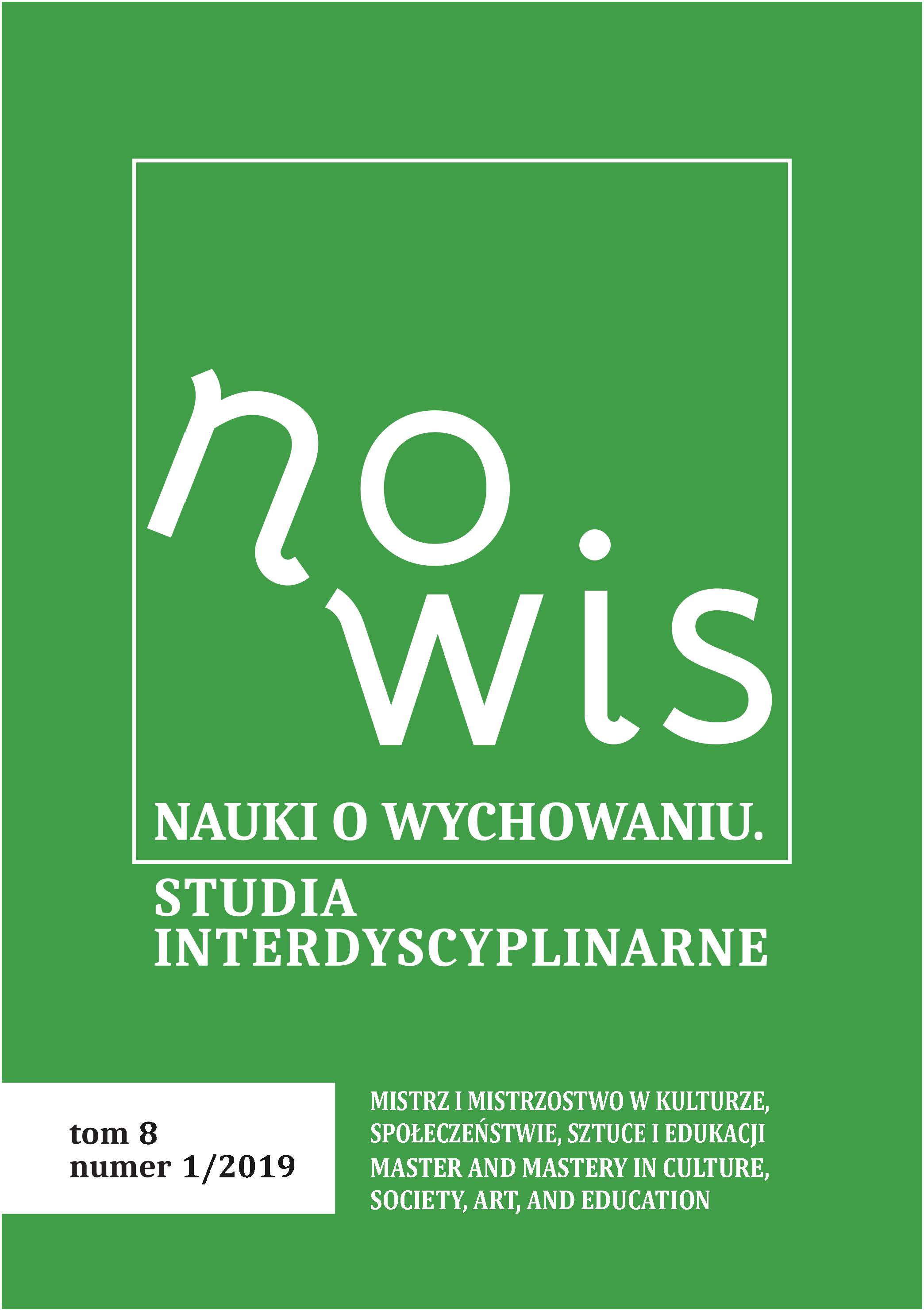Looking for „Self” at the Intersection of „Master/master” Discourses
DOI:
https://doi.org/10.18778/2450-4491.08.09Keywords:
Master/master–disciple relationship, scientific (academic) auto/biography, hermeneutics of the subject, Michel Foucault, reflexivityAbstract
The article discusses the problem of constructing the identity of the modern subject that appears at the intersection of lived experience and the description of it. It is treated as instrumental, a sphere of Master/master–disciple relationship, framed by the author as “existing in a Master/master universe.” The results of the author’s own research on scientific (academic) auto/biographies, as well as other resources revealing different aspects of the Master/master–disciple relationship, serve as the main point of reference for creating the descriptive, interpretive, and analytical layers of the article. They are presented in a mode of anthropologically-oriented text analysis supported by—located in the context of Polish educational sciences—Michel Foucault’s concept of “the hermeneutics of the subject.”
References
Bielik-Robson A. (2000) Inna nowoczesność. Pytania o współczesną formułę duchowości, Kraków, Universitas.
Google Scholar
Davidson A. I. (1990) Spiritual Experiences and Ancient Philosophy: An Introduction to Pierre Hadot, “Critical Inquiry,” 3: 475–482.
Google Scholar
Dudzikowa M., Bera R. (Eds.), Transkrypcja… (2012) Transkrypcja panelu dyskusyjnego „Miałem Mistrzów — staram się podążać ich tropem(?),” “Rocznik Pedagogiczny,” Radom, Państwowy Instytut Badawczy: 7–26.
Google Scholar
Foucault M. (2000) Techniki siebie in: Filozofia, historia, polityka. Wybór pism, transl. by D. Leszczyński, L. Rasiński, Warszawa–Wrocław, Wydawnictwo Naukowe PWN: 247–275.
Google Scholar
Foucault M. (2010) Troska o siebie in: Historia seksualności, transl. by T. Komendant, Warszawa, Wydawnictwo Słowo/obraz terytoria: 283–436.
Google Scholar
Foucault M. (2012) Hermeneutyka podmiotu, transl. by M. Herer, Warszawa, Wydawnictwo Naukowe PWN.
Google Scholar
Frank A. W. (1995) The Wounded Storyteller: Body Illness, and Ethics, Chicago, University of Chicago Press.
Google Scholar
Heyes C. J. (2007) Self-Transformations, Foucault, Ethics, Normalized Bodies, Oxford, Oxford University Press.
Google Scholar
Jäkel O. (2003) Metafory w abstrakcyjnych domenach dyskursu. Kognitywno-lingwistyczna analiza aktywności umysłowej, gospodarki i nauki, transl. by M. Banaś, B. Drąg, Kraków, Universitas.
Google Scholar
Kafar M. (1997) Tematy, których mi nie odradzano. Szkice z antropologii współczesności, master’s thesis written under the supervision of A. P. Wejland, Łódź.
Google Scholar
Kafar M. (2014) Michel Foucault as a Heterotopia in: Scientific Biographies: Between the “Professional” and “Non-Professional” Dimensions of Humanistic Experiences, M. Kafar (Ed.), “Biographical Perspectives,” vol. I, Kraków–Łódź, Wydawnictwo Uniwersytetu Jagiellońskiego, Wydawnictwo Uniwersytetu Łódzkiego: 121–137.
Google Scholar
Kafar M., Kola A. F. (2016) Mistrzowie — preliminaria. O założeniach pewnego projektu badawczego, “Nauki o Wychowaniu. Studia Interdyscyplinarne,” 2: 190–196.
Google Scholar
Kubinowski D. (2012) Rygor czy sztuka badań naukowych w pedagogice, “Rocznik Pedagogiczny”, M. Dudzikowa, R. Bera (Eds.), Radom, Państwowy Instytut Badawczy: 123–140.
Google Scholar
Kubinowski D. (2017) Między etnochoreologią stosowaną a etnopedagogią. Przykład interdyscyplinarnych badań podłużnych w działaniu, “Przegląd Pedagogiczny,” 1: 142–154.
Google Scholar
Kubinowski D., Nowak M. (2006) Wstęp in: Metodologia pedagogiki zorientowanej humanistycznie, D. Kubinowski, M. Nowak (Eds.), Kraków, Oficyna Wydawnicza „Impuls”: 7–14.
Google Scholar
Marynowicz-Hetka E. (2015) Pedagogizacja życia społecznego — spojrzenie z oddalenia, “Nauki o Wychowaniu. Studia Interdyscyplinarne,” 1: 178–189.
Google Scholar
Marynowicz-Hetka E. (2019) Pedagogika społeczna. Pojmowanie aktywności w polu praktyki, Łódź, Wydawnictwo Uniwersytetu Łódzkiego.
Google Scholar
Miłosz C. (1976) Utwory poetyckie. Poems, Ann Arbor, Michigan Slavic Publications: 316.
Google Scholar
Nussbaum M. (1985) Affections of the Greeks, “New York Times Book Review,” November 10: 13.
Google Scholar
Osiatyński W. (1980) Myślenie i twórczość, czyli o potrzebie tolerancji (Władimir S. Bibler) in: Zrozumieć świat. Rozmowy z uczonymi radzieckimi, Warszawa, Czytelnik: 347–359.
Google Scholar
Sendyka R. (2015) Od kultury ja do kultury siebie. O zwrotnych formach w projektach tożsamościowych, Kraków, Universitas.
Google Scholar
Skarga B. (2004) Ślad i obecność, Warszawa, Wydawnictwo Naukowe PWN.
Google Scholar
Sulima R. (1995) Józef Tkaczuk i inni, czyli o imionach widywanych na murach.
Google Scholar
Przyczynek do etnografii miasta, “Polska Sztuka Ludowa. Konteksty,” 2: 52–64.
Google Scholar
Słownik Języka Polskiego PWN, (1999) Warszawa, Wydawnictwo Naukowe PWN.
Google Scholar
Tokarska-Bakir J. (1995) Dalsze dzieje syna marnotrawnego. Projekt etnografii nieprzezroczystej, “Polska Sztuka Ludowa. Konteksty,” 1: 13–22.
Google Scholar
Wejland A. P. (2004a) Wspólnota świadectwa. Charyzmatyczne opowieści o uzdrowieniu, “Łódzkie Studia Etnograficzne,” 43, Łódź, Polskie Towarzystwo Ludoznawcze: 29–77.
Google Scholar
Wejland A. P. (2004b) Jak żegnać lokalne paradygmaty. O metodologii wywiadu i naukowych wspólnotach dyskursu, “Kultura i Społeczeństwo,” 1: 207–220.
Google Scholar
Wejland A. P. (2013) Zaangażowanie i autobiografia in: M. Kafar, W świecie wygnańców, wdów i sierot. O pewnym wariancie antropologii zaangażowanej, “Perspektywy Biograficzne,” vol. 3, Łódź, Wydawnictwo Uniwersytetu Łódzkiego: 9–17.
Google Scholar
Wejland A. P. (2014) Horizon—Conversion—Narration: Identity and Otherness in the Scientific World of the Humanists in: M. Kafar (Ed.), Scientific Biographies: Between the “Professional” and “Non-Professional” Dimensions of Humanistic Experiences, “Biographical Perspectives,” vol. I, Kraków–Łódź, Wydawnictwo Uniwersytetu Jagiellońskiego, Wydawnictwo Uniwersytetu Łódzkiego: 21–42.
Google Scholar
Witkowski L. (2007a) Między pedagogiką, filozofią i kulturą. Studia, eseje, szkice, vol. III, Warszawa, IBE.
Google Scholar
Witkowski L. (2007b) Mistrz jako obosieczna zasada komunikacji (dylematy pedagogiczne) in: L. Witkowski, Między pedagogiką, filozofią i kulturą. Studia, eseje, szkice, vol. III, Warszawa, IBE: 266–277.
Google Scholar
Witkowski L. (2007c) Wstęp do problemu fenomenologii czytania in: L. Witkowski, Między pedagogiką, filozofią i kulturą. Studia, eseje, szkice, vol. III, Warszawa, IBE: 29–66.
Google Scholar
Witkowski L. (2013) Przełom dwoistości w pedagogice polskiej. Historia, teoria, krytyka, Kraków, Oficyna Wydawnicza “Impuls.” Witkowski L. (2014) Niewidzialne środowisko. Pedagogika kompletna Heleny Radlińskiej jako krytyczna ekologia idei, umysłu i wychowania. O miejscu pedagogiki w przełomie dwoistości w humanistyce, Kraków, Oficyna Wydawnicza “Impuls.”
Google Scholar
Witkowski M. (2014) Zbrodniarz i dziewczyna, Warszawa, Świat Książki.
Google Scholar
Downloads
Published
How to Cite
Issue
Section
License

This work is licensed under a Creative Commons Attribution-NonCommercial-NoDerivatives 4.0 International License.





 The journal's website, created and edited by the NOWiS Editorial Team on the Index Copernicus platform:
The journal's website, created and edited by the NOWiS Editorial Team on the Index Copernicus platform: 





